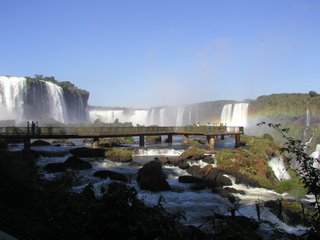Ray Ison, Professor in Systems at the UK Open University since 1994, is a member of the Applied Systems Thinking in Practice Group. From 2008-15 he also developed and ran the Systemic Governance Research Program at Monash University, Melbourne. In this blog he reflects on contemporary issues from a systemic perspective.
Sunday, December 17, 2006
Monday, November 27, 2006
Why is this the case? Because there are so few analyses being done by disinterested parties and because the methodologies adopted are not up to the job. Few make transparent the boundary judgements that are made in relation to any costings (i.e. what is internalized and what is externalized). It also seems that the worldviews of the investigators rarely consider the extent to which energy use minimisation and/or energy use efficiencies might be gained (mainly because this is seen to threaten economic growth, as currently calculated). Ultimately the energy is for the benefits of citizens and it will be citizens who decide. A new website with informed factsheets is aimed to help citizens make up their own minds.
Sunday, November 26, 2006
outlines how much money has been spent and wasted by the Blair government, including on the NHS Connecting for Health project. The claim is made that the government:
'has blown £70 billion hiring management consultants to do the work of ministers and civil servants — badly'.
Friday, November 24, 2006
For some time I have been conscious that The Australia Institute seemed to be the only critical, alternative voice in town (i.e. Oz). Thinks tanks have an important role but I must admit to not knowing the lay of the land here very well, as yet.
None-the-less it is good to see a new one, New Matilda, launched to provide a much needed set of additional perspectives.
An intriguing article in New Scientist, worth a read. What it does not address is how, if at all, we might continue to co-evolve as a species with our world.
Thursday, November 23, 2006
An inspiring story on last night's 7.30 report on ABC TV tells how a Festival of Healthy Living initiative of Melbourne's Royal Childrens' Hospital is helping to build resilience in disadvantaged communities. It seems to me a good example of dealing with a complex issue systemically. In the programme 'the hospital's mental health service works with professional performers to help school students create a fun show in which they learn how to juggle the ups and downs of life'. This has had systemic effects throughout the community.
Lets hope it can be sustained and the gains institutionalised in some way.
It is not often I find Rupert agreeing with me. But on the matter of broadband we are in total agreement (see my earlier posting).
He is reported as saying:
“I think it is a disgrace, I think we should be spending – the Government with Telstra should be spending – $10 billion or $12 billion on it (so it gets to) every town in Australia – they do it in Japan, they do it in South Korea, we should be able to do it here,” he said.
“We are being left behind and we will pay for it.”
A significant report about these issues has just been released and gained media attention. As a colleague notes:
'These are related to the NHS IT programme. They were inspired by ministers' belief that NHS IT was working, and so could be 'rolled out' to other areas of 'e-government'. If experience - and the courts - support [the view arrived at in the report] that the children's databases are both unsafe and illegal, this will have dire effects on CfH [Connecting for Health]. NHS computing will fail similar safety tests, and keeping children's records on central NHS systems without the consent of both children and their parents will be unlawful. The NHS must therefore provide for treating dissidents without the details being recorded on central systems.'
Next Tuesday, 29th November a national campaign will be launched to persuade people to opt out of NHS central data collection at a meeting of No2ID at Imperial College [London]. The meeting publicity has also been released.
Sunday, November 12, 2006
according to an article on the Amicus Union web-site.
"According to an independent survey commissioned by Amicus union , NHS staff in London lack confidence in the implementation of the NHS' controversial new IT system to link GP surgeries to hospitals. Only nine per cent of respondents believed that their views had been taken into account and only eight per cent believed the new system will represent value for money. Eighteen per cent disagreed with the statement 'the new IT system will help them do their jobs better' and 49 per cent did not know. The respondents were asked a number of questions on their attitudes towards the implementation and eventual outcome of the IT new system. A surprising number of respondents were unable to answer many of the questions, choosing the "don't know" option. 42% of the respondents did not know whether the new IT system for transferring patients records between GP surgeries and hospitals would be quicker and more efficient. 48% did not know whether the new IT system would decrease bureaucracy. The survey was conducted to gauge the level of consultation over the introduction of new IT systems in the NHS. NHS Connecting for Health is delivering the National Programme for IT to bring modern computer systems into the NHS aimed at improving patient care and services. The NHS over the next ten years intends to connect over 30,000 GPs in England to almost 300 hospitals and give patients access to their personal health and care information. BT, is responsible for deploying NPfIT (National Programme for IT) software in London. Whilst the union acknowledges the importance of the new IT system for improving patient care, the lack of staff involvement is symptomatic of the NHS' and its providers failure to listen to its staff who are responsible for delivering patient care. Amicus is calling on the NHS and its providers to give end users a greater say and more information on the delivery of the new IT system. Whilst the NHS has undoubtedly got better, morale amongst health service employees is at rock bottom, made worse by a series of rapidly introduced changes without the involvement of staff. . ."
Friday, November 10, 2006
I described earlier how much I appreciated McGahern's 'That they may face the rising sun'. Now, having read 'Memoir' it is possible to comprehend and appreciate the seminal childhood experiences from which his writing emerges. For me, he summed up what it was like growing up in his Ireland when he says:
'In that country [Ireland], individual thought and speech were discouraged. Its moral climate can be glimpsed in the warning catch phrases: a shut mouth catches no flies; think what you say but don't say what you think; the less you say, the more you'll hear. By 1950, against the whole spirit of the 1916 Proclaimation, the State had become a theocracy in all but name. The Church controlled nearly all of education, the hospitals, the orphanages, the juvenile prison systems, the parish halls. Church and State worked hand in hand. Women and single men were in a lower scale on the public services, a higher scale was in place for married men. The breaking of pelvic bones took place during difficult births in hospitals because it was thought to be more in conformity with Catholic teaching than Caesarian section........ People did not live in Ireland then. They lived in small intense communities,which often varied greatly in spirit and character over the course of even a few miles.' (p.210).
If one needs it, his experience provides a powerful, personal rationale for the separation of powers - of church and state.
We benefit immensely from his capacity to rise above his experience, generate such prose and to conclude:
'Through work and reading and reflection I had come to separate morals and religion, to see morals as simply our relationship with other people and the creatures of the earth and air, and religion as our relationship with our total environment, the all that surrounds our little lives. I had come to see the story of Jesus as a story among other sacred stories that sought to explain and make palatable the inexplicable.' (p.222)
As I read I wondered what the book evoked for my colleague John, who grew up in a similar Ireland and, as with McGahern, lost a Sue, whom he loved dearly, to breast cancer.
This experience mainly applies to people I would expect to know better (they have usually been involved in Higher Education for some time but seem to have a very limited appreciation of the diversity of 'university models' that exist).
The OU pioneered supported open learning. It has a main campus at Walton Hall, Milton Keynes, where about 3000 staff work. It has traditional academic Faculties such as Science, Arts, Humanities, Business School, Technology, Maths & Computing (the latter two are about to merge), Health and Social Care, Education & Languages. In 2004/5 there were 202,853 students in total of whom 162,966 were from the UK. There were 782 part-time and 724 full-time post-graduate research students among these. Staff numbers in 2004/5 were 1114 salaried academic staff, 1409 academic related staff, 1909 support staff and 7497 associate lecturers. Academic staff are engaged in teaching, research, administration and third mission activity as in other HE institutions.
In the 2006 UK National Student Survey a total of 95 per cent of the OU's survey respondents reported that they were satisfied or mostly satisfied with their experience of studying with the OU; the figure puts the OU ahead of all other surveyed providers. The average "overall satisfaction" score of 4.5 of a possible five marks was the highest of any of the 129 institutions across the UK for which the survey results have been published. The OU has retained the overall satisfaction rate that it achieved in 2005. The OU were also rated first for assessment and feedback (as we were in 2005), and third for academic support (as we were in 2005). More than 157,000 students - of whom 8,800 were from the OU - took part in the survey. Further details of the survey can be found at the Teaching Quality Information website.
The achievement of this level of overall satisfaction for the second year running emphatically demonstrates the quality of the OU's teaching and student support.
The Open University's commitment to broadening access to education is being taken to another level with the launch of OpenLearn, its major new open content initiative. The OpenLearn website makes educational resources freely available on the internet, with state-of-the-art learning support and collaboration tools to connect learners and educators.
This £5.65 million project, generously supported by a grant from the William and Flora Hewlett Foundation, will cover a full range of subjects from arts and history to science and nature, at all study levels from access to postgraduate. Available to learners and educators throughout the UK and worldwide, the project will be of particular significance in The Open University's efforts to widen access to hard-to-reach groups and tackle educational disadvantage both within the developed and developing worlds.
On the OpenLearn site material relating to Systems can be found under the Technology heading.
Thursday, November 09, 2006
On Monday I had a very enjoyable and long lunch with Frank Fisher whose work I have admired over many years. At one stage I tried hard to set it up so that Frank could take a sabbatical at the OU or that we could collaborate on systems-informed environmental education (particularly our Masters in Environmental Decision Making), but in the end it did not eventuate. The good news is that despite the demise of his very influential MSc (due to structural and cost changes in the local MSc 'market') he still has a project based at Monash and a new book which brings together most of his work.
The project is aptly called 'Understandascope' and uses one of Michael Leunig's insightful cartoons to symbolise the project. Frank and I are both interested in taking a double look - understanding understandings! (At the OU we use the same cartoon as an organising metaphor in our course 'Managing Complexity. A systems approach').
The book, 'Response Ability' is doubly welcome - it brings together an important set of ideas developed over a lifetime of contributing to making the difference that makes a difference. It also, perhaps for the first time, makes Frank's ideas accessible as it has sometimes been difficult to keep track of the range and scope of Frank's work.
Frank Fisher also lecturers at the National Centre for Sustainability.
His new publication is entitled RESPONSE ABILITY - Environment, Health and Everyday Transcendence the collected works of Frank Fisher.
Interested readers can purchase a copy of his book for $34.95 (plus GST) from the National Centre for Sustainability, Swinburne University of Technology Hawthorn Campus. Please call +61 3 9214 5997 to place your order.
Or contact the publishers: Vista Publications PO Box 76 St. Kilda Victoria, Australia 3182 Telephone: +61 3 9534 8881
The saga with the NHS Connecting for Health (CfH) IT project continues unabated. This article from the Telegraph suggests a government moving into damage limitation mode.
"The Government has admitted that Connecting for Health, the Department
of Health agency in charge of its disastrous NHS IT programme, could be
scrapped.
The admission comes amid growing alarm in the Government at the
spiralling cost of the programme which is likely to end up at £20
billion — £7.6 billion more than its original budget."
Our group of 23 Professors of Computing and Systems (see earlier posting) has continued to monitor what has been happening with CfH and now have a public Wikki with a very wide ranging set of comments and critiques. It includes details of some further actions we have taken as a group (e.g. more letters etc) in our attempt to get government to take seriously our initial request for an independent review.
This recent action suggest that others are now beginning to recognise that they are staring systemic failure in the face!
Wednesday, November 08, 2006
History is a good starting point for appreciating strategic risk - history of understandings, practices and situation. For example anyone entering the nuclear 'debate' ought first, amongst other things, read Wolves Eat Dogs by Martin Cruz Smith or visit Chernyobyl in person.
Australians who have lived, worked, or visited Indonesia might also do well to reflect on their experiences there in the light of today's announcment of a new 'security pact' to be signed by both countries. This pact was negotiated secretly and has cooperation over nuclear power development as a key component. From my experience 'nuclear' and 'Indonesia' are not two terms I would ever choose to associate!! I have lived in Indonesian and have the greatest respect for Indonesian citizens but, reflecting on the physical geography of the archipeligo and the political and institutional history of the Indonesian nation, I am alarmed. Australia's own record in relation to 'technology push' onto Indonesia is also not good. Nor is the record of mine management in relation to the environment.
It seems the setting for yet more systemic failure is being created!
I have been wondering what lessons Australia, as a resource rich nation, could learn from Norway. Here is some background on Norway and its social model, as the first part of my inquiry.
For those who know about The Natural Step's conceptual framing of issues associated with sustainable development this new report will only confirm what they already know and accept. It is none-the-less frightening that we have been so reluctant to adopt the precautionary principle in relation to man-made chemicals (in addition to transgenics and, possibly, nano-'organisms' - all 'man-made'). The TNS claim is that it 'uses a scientific, systems-based framework to educate both corporations and governments in how to understand and apply the principles of sustainability in all that they do'.
This disturbing new article says:
"An explosive report from researchers in the United States and Denmark talks of a "silent pandemic" of neurodevelopmental disorders caused by toxic chemicals spilling into the environment.
They include conditions such as autism, attention deficit disorder, mental retardation and cerebral palsy.
The scientists identified 202 industrial chemicals with the potential to damage the human brain, and said they were likely to be the "tip of a very large iceberg". More than 1,000 chemicals are known to be neurotoxic in animals, and are likely to be harmful to humans."
Wednesday, November 01, 2006
On ABC TV last night and again on radio national this morning Irene Khan, Secretary General of Amnesty International, here to receive the Australia Peace Prize at the University of Sydney, demonstrated a powerful, ethical intellect that puts the level of public discourse, and that of the current government, to shame. Her arguments are cogent, ethically grounded and systemic. Her take on the Australian notion of 'mateship' shows how vacuous the PM's views on the same subject are. As she says, this government has renigged on its international responsibilities for creating 'mateship' at a global scale. The failure to sign the Kyoto agreement and to support UN action in Iraq being the more notable examples.
Wednesday, October 25, 2006
The last two weeks have been fascinating here in Oz - a combination of circus and hallelujah! For the first time since coming into office the coalition government has been forced on to the back foot, politically, in relation to its stance on climate change. A number of factors have triggered this shift:
The first is the drought here in Oz and the underlying data about climate patterns and shifts. There are also significant, and distressing, social impacts. Drought, and underlying climate change, begin to be taken seriously by the coalition when it affects economic performance, particularly economic growth rate and the balance of payments.
The second has been the release of the Stern Report, and the resultant criticism, both explicit and implicit, for Australia's stance. The Uk Chancellor, Gordon Brown is to be commended on commissioning the report and attempting to raise the level of awareness, debate (I hope) and, hopefully, action.
The third is that the coalition is suffering in the polls - Australians are by an overwhelming majority dissatisfied with government performance in relation to climate change. Of course all three factors are interrelated.
Fortunately the government, either through clever design, or sheer good luck, has had some projects to announce as evidence of action. Some of these are welcome - others misguided.
Despite the circus (with its light as well as serious moments) what seems apparent to me is that the PM (and his government) just do not get it! (Or as my daughter reminds me, choose not to get it!). What is it that they do not get?
1. Their decision to reject Kyoto was not simply failure to sign a document, as the PM would have us believe, but a rejection of Australia's role as a responsible nation in an era when a new committment to internationalism is urgent. This is a point made lucidly by Irene Khan. Kyoto is flawed - everyone knew that, but it was a first step in what needs to be an on-going process. The stance taken by Australia and the USA has undermined the social and political capital for generating 'Kyoto 2' (as the PM is describing it!). The stance has also weakened Australia's position in international affairs, compounded of course by the government's Iraq policy (on this point see a recent survey of citizens of different countries which shows that most people see the US and George Bush as the biggest threat to international security - and how American's feel about themselves is changing).
2. The arguments as to why Kyoto was not signed appear increasingly specious. As the Stern Report makes clear the situation concerning climate change is a case of massive market failure. I wonder if this message is being taken on board in Canberra and other bastions of neo-classical economic ideology?
3. The stance in Australia can only be put down to one factor - political intervention on behalf of the coal industry (see my earlier posting). 'Clean coal' is both an oxymoron and a dangerous metaphor! Contrast the Australian stance with that of Sweden.
4. Whilst the government has launched a series of projects to address climate change what is singularly lacking is a systemically feasible overall policy. Despite recent denials there is still a policy vaccuum. It remains to be seen as to whether the PM (and the 'dirt digger' states of WA and Queensland) will accept the idea that the next COAG meeting of state and federal governments should be devoted to climate change.
5. Not only is there no coherent overall policy for climate change, the same applies to rural development. Handouts during droughts achieve very little in the long-term. What seems to be lacking is a national strategy for rural development in which all States and Commonweath are working together to effect more sustainable livelihoods for rural Australians. This involves mutifunctionality (as the Europeans describe it) as well as strategies to enhance the relationship between urban and rural Australians. This must also involve biodiversity conservation, management of ecosystem services, national strategies re feral pests and weeds and the provision of adequate services to make living in rural Australia a viable proposition in today's social and cultural context.
6. Finally there is a faith in technology and the overall technology mix that is questionable. New technology requires a conducive institutional environment. The investment in the large solar energy project is welcome. But what about wind? On my recent travels I had dinner with someone who had purchased second-hand wind turbines in the Netherlands and shipped them back to Australia with a view to setting them up in the NSW Hunter Valley. So far he has met only obfuscation and delay in trying to get his scheme going. In the German state of Schleswig-Holstein wind is already capable of providing one-third of energy needs whilst occupying less than 1% of the land area. Also, why are technologies like 'rock heating' missing from the mix?
The States are not above attention. With an election campaign in Victoria and one next year in NSW it is to be hoped that whoever is elected can, as a matter of priority, form their new governments around a whole of government approach to sustainable development.
Monday, October 02, 2006



And so back to Melbourne - the good, the bad, the ugly
I have been on the road, more-or-less, for a month. I have driven almost 5000km – some of those day-long trips of up to 12 hours. What impressions am I left with?
The good
Some of the best moments of this trip were unexpected – particular incidents with some of the friends and relatives (often distant) I chose to look up, such as the tears that came when an 83 year old first cousin of my mother’s saw, for the first time, a wedding photo of his parents, in my ‘White family’ manuscript. His parents divorced when he was a boy and his mother had destroyed all photos of his father. Later I heard how his experiences of the depression and of the hypocrisy of the established church had led him towards socialism and ultimately to becoming an active member of the Australian Communist Party – something long suppressed in my branch of the family! There were other, similar moments.
I come back more connected with friends and family and having unearthed some of the multiple narratives that give rise to one’s sense of place and identity. In Ryde Library, quite by accident, I came across a photograph taken outside Ryde Church of England Parochial School in 1873 - I feel confident it included my great-great grandmother and grandfather.
I wondered at the skills needed to read the Australian landscape. Particularly the subtle differences that need to be discerned if one is to avoid being left with a sense of unending sameness. The bark of the trees – see earlier posting – is part of it. Bark, leaves and flowers are used to identify different tree species, which together with soil type are the main features to be used in ‘reading the land’. In Europe the cultural, architectural and biopysical diversity of a 5000km journey would be much more obvious!
I was struck by the evidence of growing catchment consciousness and the never-ending blueness of the day-time sky.
I came back feeling more positive about Melbourne - it is much more accessible and people-friendly than Sydney now is - one can walk easily around Melbourne CBD and inner suburbs and the trams are great asset. Then there is the cafe scene - more accessible in Melbourne. A good city to implement 'walk-to-work day'.
The bad
For much of my trip I thought it was already too hot - a sign of living too long in England perhaps! Or more likely an effect of significant climate change. Fire and very severe drought seem certain over summer.
I was surprised to find that after 12 years the Hume Highway has not yet been completed - there are still several 'death-trap' stretches.
Imagine only one cafe in Darling St, Balmain with internet access!!!!!... and then you have to pay by the 15 minute slot, and the download speed is so slow that you can only get about one file loaded or downloaded per sesssion! Compare this, and the general 'connectivity scene' in Oz with what is happening in Milton Keynes:
'Milton Keynes looks set to become the first British town to get a high-speed wireless
network based on so-called Wimax technology.
Net connection firm Pipex is to trial a network in the town, which should be up and running
by the end of 2006.
Unlike wi-fi technology, Wimax offers high-speed net access over long distances, instead of
just a few metres.
Pipex said it hoped to have Wimax deployed in eight UK towns by 2008'.
This example reflects, it seems, a more pervasive, systemic issue - the lack of significant investment in public infrastructure. There is also a preoccupation with road developments (but not rail) in the major cities. What are the budget surpluses being used for?
I can't understand why Sydney and Melbourne are not following Ken Livingston's lead in London and introducing a congestion charge. Both cities would become much more person and bicycle friendly immediately.
The ugly
One only has to drive through country towns to discern the extent of rural poverty. In one coastal NSW town I visited over 56% of people in the local government area are registered with CentreLink (similar to social security). Australia it seems has become a series of city-based island communities on a vast continent, each with their tribal loyalties (manifest within the Federal Liberal party in terms of the Sydney vs Melbourne cabals). Has Australia an effective national rural development strategy?
It is argued on the web site of the Australian Local Government Association that:
'Soundly based economic and regional development is fundamental to the wellbeing of Australian communities. Effective local government participation is vital to the success of economic development initiatives, and local councils, singly or in groups, have long been at the forefront of such initiatives. They have allocated large amounts of time, energy and resources to promoting economic growth in their areas, and have forged valuable partnerships with business, unions and other key players. '
Despite the rhetoric my recent experience suggests that they are fighting a losing battle! Somewhere in the not too distant past rural Australia has slipped below the horizons of the majority of the population.
Australia still has, it seems, an ecologically sustainable development strategy (or at least it has a web site) hosted by the Department of the Environment and Heritage. The very same department was largely cut out of developing Australia's stance on Kyoto and responsibility for the burgeoning water issues across the nation has been vested in a new Office of Water Resources within the Prime Minister's own Department (not mentioned under 'whats new' on the DEH website!!).
Ribbon development is not common in the UK - here it blights the outer margins of almost every town and city. Planners and developers seem to be conspiring to develop urban fringe mortgage ghettos, something exacerbated by rises in petrol prices and interest rates and underinvestment in public transport. Aesthetically it leaves much to be desired and seems ill-equipped to handle the increased fire frequency we are likely to experience.
During my trip the story of air quality in Sydney's road tunnels hit the headlines. This is a particularly ugly situation, if the report I heard on air is valid. This site explores some of the issues as they stood in 2003 and the RTA gives some 'official' background.
Clover Moore, Lord Mayor of Sydney says:
'There seems to be a real resistance to government investing in public transport infrastructure in Australia's cities in recent decades. I'd go as far as saying there's actually an anti-public transport bias. Public transport has been viewed by governments as a social cost - as a type of welfare program for those who can't afford to drive. The assumption has been that if you are a productive and successful citizen then of course you will always choose to drive a car rather than catch public transport.'
She touches on perhaps the most ugly issue one encounters - a crisis in thinking, and thinking about thinking! This is coupled with, it seems to me, a deficieny in the democracy dialectic! Difference is not valued, promoted, facilitated or respected.
Monday, September 25, 2006

Contemporary images of Oz
Having a coffee in the lounge at Armidale airport – just off the New England Highway I was confronted with the following:
‘Caution
It is an offence to make jokes about bombs or weapons or leave luggage unattended. Penalties exceed $5,000
Aviation Transport Security Regulation 2005’
Overnight on ABC radio national I heard a programme exploring some of the systemic implications of current Australian legislation, drawing attention to the propensity of parliamentarians to legislate in the face of crisis, as if this were the only form of action open to them. Government is also intervening in what research can be conducted on the subject. This University of NSW site offers more perspectives.
Later from my hotel window at Cronulla Beach in southern Sydney I am invited to consider Gary’s Original Greek Yum Cha, all I can eat for only $30! A good example of cultural fusion? Also a metaphor for the current passion of urban life in Oz– eating and drinking! Obesity is a major problem in Australia. A quick walk around the local shopping centre here at Cronulla reveals every other shop as some form of food or drink outlet.
Yesterday, Sunday 24th September was one of those horrendous Oz days when the fragility of European settlement is revealed. Winds from the north-west, gusting at 90km per hour or more, a dry landscape and temperatures into the 30s – some of the highest September temperatures on record. Several houses were destroyed by fires, one man, a motor-biker, was killed when the branch of a gum tree fell on him as he travelled through the Kangaroo Valley (a very Australian form of death!).
In my travels on this trip – now over 3,500km – I can see that most of NSW is still in drought, some of it ‘green drought’. Unless there are significant falls of rains in the next month or so much of the grain harvest will fail or be depleted, stock will also fare poorly over a summer with little pasture growth. Worst of all, if there are more days like yesterday, much of NSW will burn. More houses will be lost and possibly lives.

Catchment consciousness
One change that has occurred, for the better, is that of (water) catchment consciousness. On road-sides and even on signs in urban roundabouts (e.g. Wagga Wagga) attention is drawn to the local catchment. It is now possible for all citizens to know their catchment address. I look forward to finding out if the extent of catchment consciousness extends beyond the placing of signs, made possible through government grants. I hope so.
Sunday, September 17, 2006
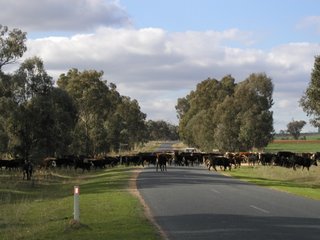
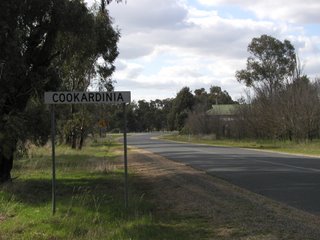
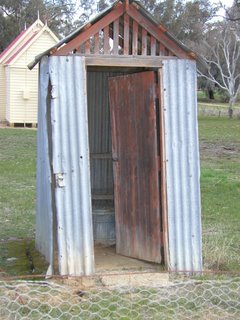
Via Culcairn and Cookardinia to Canberra….
In Australia members of the Coleman family have been teachers or academics in every generation. My great-great grandfather, Joseph Coleman began teaching at Kurrajong Denominational School in 1865. His two sons also became public school teachers. Most of the schools they taught at were one teacher primary schools and many were in quite isolated communities. Joseph’s grandson, Horace Coleman, also became a school teacher, his last school being Cookardinia. Today Cookardina is a blink and miss place – just two sign posts on the road, unless you slow down to take a close look or follow the sign to the local cemetery. If you do go to the cemetery you will see some distinctive Australian architecture (see photo).
Coming over the ridge from Culcairn there are magnificent views of the Cookardinia valley (although it is probably not called this). I am not sure if my Coleman ancestors appreciated it or not.
On the 25th June 1923 there is on Horace’s teaching file a medical certificate saying: ‘This is to certify that Mr Horace Coleman is suffering from threatened nervous breakdown and it has been on my recommendation that he applied for leave’. His wife had died suddenly, aged about 38, a few days before. The following year is a telegram addressed to Mr Melville, Inspector of Schools, Albury, dated 22nd July 1924 saying: ‘Mr Coleman teacher Cookardinia passed away last night. Dulcie Coleman’. Dulcie was just 17 and her sisters Iris and Myrtle, 12 and 10 respectively. Horace was 43. It was a hard life.
Rural Australia is still a hard life for many – I passed several mobs of cattle out in the ‘long paddock’ (the roads and travelling stock routes) that are used in times of drought. The countryside was green but it will be a green drought without further rainfall.
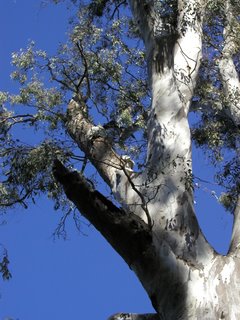
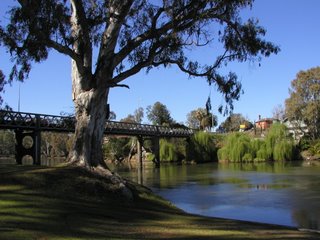
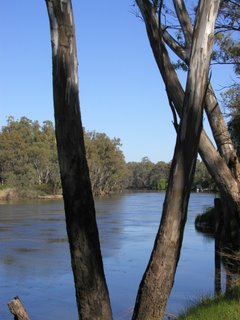
On the Murray …Corowa and Australian Federation
In the 1890s economic activity was being constrained by the taxes and tariffs that the States were imposing on trade with each other. This was in part the impetus for the 1892 Federation conference in Corowa. As an aside, one of Daniel Coleman’s sons-in-law, Edward Hyde McGuiness, was a tax inspector, and may have had something to do, indirectly with the Corowa conference. The bridge over the Murray joining Wahgunya with Corowa was one of the main crossing points from Victoria to NSW.
Another of Daniel’s sons lived for a time in Corowa and, as I had never been there, this was my next stop. Of the many motels in town only one had broadband access! It just happened to be in Edward St where Edward Daniel Coleman and his family had lived just before, and during the early part of World War 1.
The historical sources were a disappointment – a continuing theme of my trip I am afraid. What I particularly found distressing was how alienated local communities seem to be (both physically and intellectually) from material and understandings about their history. Rather than politicians like the PM exhorting more effective teaching of history in schools they might do well to fund local communities to build up their resources – both social and material.
Early morning on the banks of the Murray was a joy.

Exhortations and ….................
Outside Bendigo, Victoria:
‘Let the peace of God disturb you’
For motorists on the freeway between Sydney and Newcastle, NSW
I't is better to be late than meet a deadline. '
(Perhaps this should be built into academic terms and conditions!!).
In Wagga Wagga, seeing this church and associated ‘business activity’, something not common twelve years ago, I was reminded of comments by Brasilian and Ecuadoran colleagues that the best way to make money in their countries was to start a church!
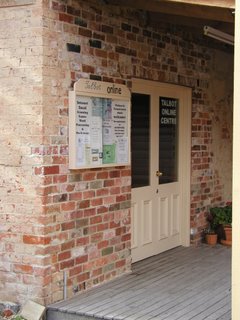
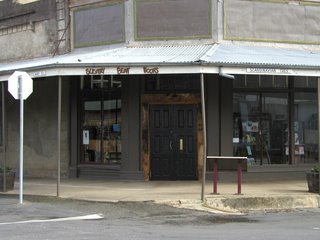
Talbot in 1860: D. Coleman, restaurater, Scandinavian Cresent
The wattles between Ballarat and Talbot were stunning. Clunes and Creswick seem intriguing places to be explored on another visit. Daniel Coleman, a brother of my great-great grandfather, married Anne Darcy, spinster, 21, born in County Tipperary, at Back Creek, Amherst (north of Ballarat), District of Carisbrook, on the 5th February 1860. Back Creek was the alternative name for what is now known as Talbot. Amherst, about three miles from Back Creek, was the main centre of mining in the area in 1865 with about 4600 people in the vicinity. In that year Talbot had a population of about 3400 with 18 hotels, including the Nil Desperandum, the United States and All Nations!
Today there are about 300 people in Talbot but is has a good café, an interesting museum, with committed staff who opened-up especially for my visit, an internet resource centre (open sometimes) and an intriguing bookshop (Slightly Bent Books) on the corner of Camp St and Scandinavian Crescent!
It was a worthwhile visit, however short - meeting Marie and her husband, finding a record for a D Coleman who had a restaurant on Scandinavian Crescent in 1860 – possibly Daniel?? There is often some reciprocity in these situations – from my research I was able to provide the name of the local Catholic Church, which no-one seemed to know - it had been deconsecrated many years ago and perhaps there were not too many Catholics about!!! Or perhaps no-one had been interested before – local history seems in a vulnerable condition in Australia, dependent on enthusiasts and the good will of volunteers. There seems little systematic support from local, state or Federal government – I am sure much is in danger of being lost.
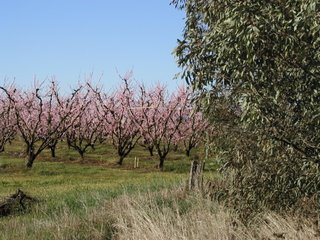

Patterns that connect
Driving from Ballarat to Corowa via Creswick, Clunes, Talbot, and Maryborough, Bendigo, Shepperton and Yarawonga there were some patterns that connected me to the Australian landscape more than others. The bark patterns of the eucalypts, angophera and other native species was one.
In some places the colours of Europe jarred, beautiful as I have found them in other contexts.
Paul Rosenberg, following Gregory Bateson, is also concerned with patterns that connect.

Journeying for emergence....on the 'Coleman trail'
For various reasons I have, till now, missed my 'summer' holidays. So I set aside much of September to rectify things. My starting point was to drive from a wet, grey Melbourne - very welcome rain I might add - to Ballarat on the trail of my elusive Coleman ancestors. I had no firm plan and no arrangements made for the first part of the journey.
The Coleman's, my paternal grandmother's family, came from Clifden in County Galway to Australia during the 1850s. They probably came during the goldrushes and the Victorian goldfields was probably their first destination. Ballarat is a pleasant city but a bit like a large home when the kids have gone away - it is hard to fill it out, and one retreats into the main spaces leaving nooks and crannies unattended. In Ballarat miners found some of the richest sources of gold in the history of Australia - fine public buildings followed, expressions of wealth and a European statement on the (relatively) new continent.
In a research sense I struck gold that afternoon in the Ballarat Library - in records of the Ballarat East Clerk of Petty sessions. I await with interest the records to see the nature of the misdemeanours of my Coleman forbears!
Ballarat revealed misdemeanours of another type. I am being metaphorical here in relation to the lack of attention by firms and government to broadband and community access. I am staggered by how 'unconnected' so many parts of Australia are when a decade or more ago we seemed to be ahead of the game. There is no internet cafe in Ballarat. In my hotel, which was not cheap, I was promised wireless access, but in the end it was down as was their own direct connection in the lounge. Hotel staff did not seem concerned, but as I sat sipping red wine in front of the fire, numerous vistors, including UK tourists, were left frustrated. They may not be back!
Friday, September 01, 2006
was the response of my daughter, a budding environmental engineer, to the news that the Victorian Government has provided a grant of nearly $1 million for Australia's first community owned wind farm, the Hepburn Community Wind Park. From the perspective of my daughter and her colleagues 'this is really amazing, because it is one step in the direction of [achieving energy sustainability through] decentralised, autonomous local neighbourhoods... '.
"David Shapero [Managing Director of Future Energy Pty Ltd] praised the [Victorian] State Government for its initiative inestablishing the Renewable Energy Support Fund. "We're delighted with the support shown by The Minister for the Environment, Mr Thwaites and also for the work Sustainability Victoria has put in over a long period." he said. "It demonstrates that the Government is keen to back local communities. Without the keen interest from the Hepburn community, this project would not have progressed so far. The local community has shown it wants to invest in appropriate renewable energy."
Systemically, such a trajectory is likely to build social capital, enhance local resilience and avoid the long-term unintended consequences of centralised energy options such as nuclear.
Much of the effort that UK New Labour has put into public-private partnerships has led to unintended consequences. From my perspective they are conceptually and systemically flawed primarly because they create institutional arrangements that conflate citizen values with consumer values (see Mark Sagoff's, 1988 book, 'The Economy of the Earth' where these distinctions are fully developed). By doing so thay fail to understand how power is enacted and what forms of praxis are required to deliver change for citizens.
It is therefore interesting to read: 'PENSIONER WINS GP PRIVATISATION BATTLE AT COURT OF APPEAL' from the 'Keep Our NHS Public Campaign' website. Here is a flavour:
'Pam Smith has today won her appeal to prevent a US healthcare corporation from running a GP surgery in Derbyshire. Lord Justices Keene and May quashed the selection of United Health Europe - the British arm of America's biggest healthcare corporation - to run the practice, and ordered North Eastern Derbyshire primary care trust to start the tendering process from scratch. They also awarded Pam Smith 100 per cent of the costs.
The decision is a stunning victory for a pensioner who dared to stand up to the might of the government, the NHS and a multi-national corporation. It is a blow for the government's reform programme of bringing in private companies to run GP services, and may discourage other private companies from involvement in the scheme.'
For a compelling critique of the New Labour culture associated with public-private partnerships see 'Plundering the Public Sector'. Chapter 10 deals with Connecting for Health, the national programme for IT in the NHS, which I described in an earlier posting. Here are some excerpts:
"The total annual budget of the NHS is around £70bn. So whatever the final cost of CfH, it means that over the next few years a huge amount of money is being taken out of, and will continue to be taken out of, patient care to fund the CfH programme. Assuming about one million employees in the NHS will be affected in some way by the programme, CfH is going to cost over £35,000 per employee - that is really quite a lot of money for management and IT systems consultancy. In fact, with CfH we are seeing consultancy support per health service employee that is almost on the scale of the £45,000 per employee paid to consultants during the catastrophic Child Support Agency programme. '"
"This brings us to the fourth phase of failing or failed IT systems projects - blame. This is when the original budget has been overspent by millions, tens of millions, hundreds of millions or even, as will be the case with CfH, billions. Years after the planned date, either nothing is yet installed or else some sort of system may be working, but it does incomparably less than was originally promised, is tortuously difficult to use and is probably costing more per transaction than the previous, largely manual way of doing things. At this point, those responsible for the system’s implementation blame those who work with it for continually changing their requirements and for not using it properly. Although by November 2005 CfH was far from completion, a rather unsightly public spat had already broken out between the director of the programme and the head of the NHS. Richard Granger reportedly wrote to a senior civil servant at the Department of Health claiming ‘ehoose and Book’s IT build contract is now in grave danger of derailing (not just destabilizing) a £6.2bn programme. Unfortunately, your consistently late requests will not enable us to rescue the missed opportunities and targets.’"
The authors have suggestions as to what should be done next.
Last week I attended the funeral of my almost 82 year old Aunt. It was a moving time for me, and others and the service was a meaningful ritual for those present. My Aunt was a third generation Australian (dating from 1850) and she had three great-grandchildren (i.e sixth generation). By the sixth generation family lineages could be traced to Ireland, Scotland, Cornwall, England, Ukraine, China (via Malaysia) and possibly more. I am sure that today many Australian families must have similar or more diversity. I am also confident that if asked everyone would have said they were Australian. But I wonder how they would have answered if asked 'what is it that makes you Australian?' Unfortunately it was a question I didn't ask.
Current Australian Federal Government practices seem intent on creating the circumstances for systemic failure and associated unintended consequences. A powerful example comes from current head of the Australian Conservation Foundation (ACF), Prof. Ian Lowe as reported in an article entitled: 'Canberra critics bulldozed: ACF head'.
It is worth citing some of Tim Colebatch's report here:
"Professor Lowe, an award-winning environmental scientist, told the National Press Club that the ACF was now being treated as persona non grata by the Government, and cut off from access to ministers. He urged the Government to "turn the ship around" and restore a balance between environmental and economic priorities, citing a range of Government decisions he said had that put the scientific community of Australia under pressure to conform, including:
* Former Education Minister Brendan Nelson overturning research grants awarded by the independent Australian Research Council, "on advice from a shadowy group of unqualified ideologues".
*Health Minister Tony Abbott "stacking" the ethics committee of the National Health and Medical Research Council with people likely to favour his "unusual view of the world".
* The CSIRO instructing its scientific experts not to comment on issues that have policy implications, which led to the resignation of its top greenhouse gas specialist, Graeme Pearman. (The instruction was withdrawn after being made public.)
In an article in the September issue of Australasian Science, Professor Lowe also cited his own removal from one government advisory council, the abolition of a second council to which he belonged, and the appointment of former Telstra chief Ziggy Switkowski to chair the inquiry into nuclear power while he was a board member of the Australian Nuclear Science and Technology Organisation."
This is an imporant article not only because of the circumstances for systemic failure that are being created but because it raises such significant ethical and political issues that are at the core of what it means to be 'democratic'.
Tuesday, August 22, 2006
The mental models of those responsible for US/Israeli policy in the middle-east seem well suited to deliver systemic failure. Seymour Hersh provides the background! As a colleague said: 'This would be ironic, on the 50th anniversary of Suez, if it were not so sad and dangerous.'
It is now six weeks since my return. It has been an exponential learning curve about Melbourne. House hunting is a good way to learn your way around, re-orient to the sun - north facing, or more strictly north-east facing rather than south facing is the go (but hard to find)! Otherwise the task is not something I enjoy. The campus and surrounds are buzzy, cosmopolitan and people are friendly, welcoming and helpful. The diversity of food and coffee outlets on campus are in marked contrast to my previous one.
The quality of light and the blue of the sky are so different from the UK. The wattle and the wine uplifting!
What has changed and what is unsettling? The TV programmes leave a lot to be desired (so do a lot in the UK). The focus of the Melbourne media on the injuries to players and on field 'assaults' in the AFL is an interesting cultural statement! I sense a growth in US-style 'self-made person' rhetoric and belief. Is this at the expense of concern for others, giving something back? After six weeks Melbourne does not feel very big.
Rises in petrol prices are causing concerns - a hot political issue. Here I can fill my car up for $52. In the UK I cannot do it for £52. I suggest most poeple here are not aware of how expensive petrol and other forms of energy are likely to become. The sprawling outer suburbs, the mortgage belts, seem unsustainable socially and environmentally (particularly when water is added to the equation). The same seems true of the car industry (reminiscent of the UK) - still a big employer in some states but surely not viable in a global economy!
This is world water week. Given the extent of concerns about water at both a global and national level I was surprised when Kerry O'Brien, presenter of the ABCs 7.30 report, found the comments of Frank Rijsberman of the International Water Management Institute, so controversial.
Tuesday, August 08, 2006
In the UK about the time of the Hutton Inquiry, or possibly the Butler Inquiry (there were so many over Iraq with such little useful effect) I observed that some politicians and journalists were starting to to use the 'S' word - 'systemic'. My colleague John Naughton drew attention to it in a blog at about that time and in a subsequent posting at the time of Charles Clarke's resignation.
This word is one of the two adjectives based on 'system' - systemic (pertaining to a system or a whole) and systematic (methodically, as in following a recipe). Fortunately recent usage suggests that those who are using it know the difference. This is true in Oz as well - a recent headline says: 'Abuse claims prompt fears of systemic problem in detention centres' .
What is not clear however is whether those using the 'S' word do so as a means of avoiding responsibility by implying that systemic failure cannot be avoided. If so this is a copout!
For over 30 years at the OU we have been teaching courses which equip students (who are usually working at the time) with concepts and skills to understand why systemic failure occurs and how, by thinking and acting systemically, many unintended consequences can be avoided i.e. how to take responsibility for avoiding systemic failure! The evidence we have is that our courses work for students, as shown by the research published in 'Waving not Drowning' drawn from alumni working within the NHS.
Despite this experience and expertise systemic failure abounds in all walks of life. For example, I was recently one of 23 academics who signed an open letter calling for a review of 'Connecting for Health', the Blair government's multi-billion pound IT project for the NHS (published in Computer Weekly on 11 April 2006 and addressed to the Health Select Committee). My motivation in contributing was to try to prevent yet another IT-based systemic failure and the loss of millions of pounds of taxpayers' money. Despite the best efforts of my colleagues, those responsible for the project, after some initial agreement that a review would be helpful, mounted a successful defence and it is more-or-less business as usual, although recent failures may re-focus attention and scrutiny. The recent failures article says:
'The project to overhaul the NHS's computer systems, costing millions, is so beset by problems that hospitals would be better off if they had never tried to implement it, according to a confidential document apparently sent by one of the scheme's most senior executives'.
The perspective of Richard Granger, the Director of Connecting for Health can be gauged from this interview.
This is not just a UK phenomen as this example from Australia demonstrates. Here is a little of what it has to say:
'The [Australian] Government faces an uphill job generating public confidence in its new hi-tech benefit card after the Auditor-General found the current system is so shoddy, almost half the records are wrong.
An Australian National Audit Office random check of 10,048 Centrelink customer records has found 45.3 per cent contain at least one error.
In 29.8 per cent of these cases, the error has a dollar impact.
The average debt caused by the errors was $1,034.
Anyone who has ever dealt with Centrelink will cringe at the prospect that 16 million Australians will have to front up for a 15-minute interview with the agency to register for the new smartcard between 2008 and 2010.'
Of course UK citizens ought to be equally, or more, concerned with New Labour's foolish committment to press on with ID cards.
In 1993 I wrote:
The drought of the early 1890's led to fundamental changes in the way the Western Division was viewed; at this time Henry Lawson (1990) wrote in his poem "Bourke":
"No sign that grass ever grew in scrubs that blazed beneath the sun;
The plains were dust in Ninety-two, and hard as bricks in Ninety-one.
On glaring iron-roofs of Bourke the scorching, blinding sandstorms blew,
No hint of beauty lingered there in Ninety-one and Ninety-two.
This was reflected institutionally in the 1901 Royal Commission, which was a landmark in that it concluded that the nature of the land itself imposed special constraints on any attempt to populate or utilise it (NSW Parliamentary Papers 1901). It is also only through the chronicles of poets, like Lawson and the myriad story-tellers that represent the Bushies oral tradition that we know of the experiences of the pastoralists. These are not incorporated into scientific discourses but are powerful in shaping the ways in which pastoralists interpret their world of experience - we are the bush, as our collaborators observed. The study of Pretty (1991) of the 3-4 fold increase in agricultural productivity in 17th - 19th century Britain is salutory as it was achieved by farmers without either institutionalised science or extension.
One hundred years later the headlines exclaim:
"Dirt poor. You think you have heard it all before .... about how Australia's farmers are suffering. But not on this scale, not in this way. The vast plains of our state's west have become a disaster area - for both people and their properties. Hopes and dreams are being eroded, just as surely as the land itself." (Wahlquist 1992).
In 1993 I asked: So what has changed?
According to Asa Wahlquist, still writing on this subject, 'things are bad, very bad, for much of the western division. How bad we will probably know only when the drought ends and the exodus begins.' The situation seems much as it was to me.
Elsewhere Asa attacks Jared Diamond's conclusions about Australian Agriculture and chronicles some of the changes for the better that she perceives. Almost daily the media runs a story on land management or water and the letters pages reveal the range of perspectives that exist on these issues. Thus far, however, I do not encounter many who feel new dams are part of the solution.
My original comments were published in Ison, R.L. (1993) Changing community attitudes. (Invited Keynote Paper) The Rangeland Journal 15, 154-66.
Wednesday, August 02, 2006
Having lived and worked in the UK for 12 years I return with dual nationality - British and Australian, something the Australian government did not allow till 2002. The recent plight of Lebanese and Israeli Australians has ignited a debate about who is really Australian and the desirability or not of allowing dual nationality. A feature article in the Australian Finanacial Review, more balanced than the Courier Mail article (but not available electronically) explores the issues and makes, in my view, strong arguments, for maintaining dual nationality arrangements. Surprisingly the government has no idea how many Australian citizens have dual nationality. If anything, based on my experience to date, I would say that Government does not go far enough in encouraging this arrangement so as to facilitate an outward-looking, globally mobile citizenry (whether virtually or physically). Certainly tax, medical care, superannuation and other arrangements seem unduly complex at this stage, not that British banks - or at least mine - seem any better. Mine cannot deal with my Australian account number for internet transfers because they are one digit short in their account code field!!.
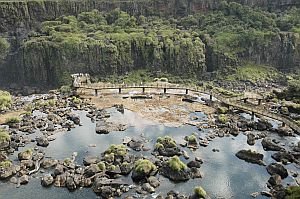
Experiencing global warming impacts
In May 2005 I was fortunate to make a visit to the Iguazu Falls on the border between Brasil and Argentina. Even at that time the river was low but the falls were spectacular. Compare the photos taken of the same area then (above) and now (below - source: Aurea Cunha/Gazeta do Povo/AE).
Climate change impact surely?
Yet in this country (Oz) the current (and long-term) Federal government are in denial presenting a policy that is perhaps best described as 'environmental terrorism'. In this case I follow the definition of terrorism as 'systematic intimidation as a method of governing or securing political or other ends'. One only has to read the paper by Clive Hamilton (The Dirty Politics of Climate Change) to see how this is enacted. The net effect is to protect vested interests (promote first-order change) at the expense of innovation and change, particularly the emergence of new insitutions and economic activity that will address the systemic basis of climate change at the same time as creating demand pull for new technologies and institutional arrangements (second-order change).
Elizabeth Farrelly, in a well crafted article, entitled 'Eyes wide shut on the issue of the century' provides some compelling arguments.
Some of the states are doing better.
Life in Oz is tough! Muesli without banana is like Heloise without Abelard. What creates this situation? Cyclone destruction of almost the whole of the local banana crop along with quarantine restrictions on imports. Prices are so high they are taking some of the blame for the rise in inflation that is likely to see home interest rates rise tomorrow to over 7%. At dinner the other night we were given bananas as a special treat!!
Monday, July 24, 2006
Perhaps it is just Melbourne but I am almost overwhelmed by the number of coffee shops, cafes and restaurants. Is the early 21st century cafe society sustainable? According to a SMH article Australians are still way behind the Finns in per capita coffee consumption and clearly out in Oz suburbia and rural areas Nescafe fans still persist! I hate to think how many empty shops there will be if there is a significant downturn in the economy. Don't get me wrong I underwent withdrawal symptoms 12 years ago after moving from Sydney to Milton Keynes! In 1994 London was little better than MK, but somewhere along the way both London and MK changed and a good coffee ...with half reasonable (if too expensive) food was possible. But somehow Melbourne almost has too much on offer. In the street outside my partner's office, where five years ago there was only one coffee shop, now there are five.
There is also the vexed issue of the 'world in my coffee cup'. As I wrote a few years ago in our Open University course, 'Managing complexity. A systems approach':
Ecological backpacking in Seattle – the ghost of coffee’s past
by Alan Durning
Alan Durning was Executive Director of Northwest Environment Watch in Seattle. This commentary was first heard on the radio show ‘Living on Earth’ on KPLU, adapted from Alan’s This Place on Earth (Sasquatch Books) and I have taken it from the book Carley, M. and Spapens, P. (1998) Sharing the World. Sustainable Living & Global Equity in the 21st Century, London, Earthscan, p. 67.
If you are not a coffee drinker like me then Alan’s story may not be as personally challenging as it was for me. To me the story lays bare the systemic connections between my behaviours and the implications of that behaviour when it is aggregated. If I imagine his story as being about a ‘system to satisfy my passion for drinking coffee each morning’ then I have to conclude that it is an effective system, most of the time, in achieving the transformation ‘passion unmet to passion met’ for me. But, his story also reveals the extent to which resources have to be used to achieve the transformation as well as the number of activities undertaken. His story makes transparent what I intrinsically know but choose to ignore in my passion for drinking my daily cup of coffee. Despite the unanticipated and undesirable outcomes of this set of activities and my heightened awareness of the emergent properties from these activities, which have long-term undesirable effects, at heart I do not want to change my behaviour! So what are the implications of my position? Well, I console myself by believing that my coffee drinking habits are not at the top of the list of sustainable development issues of which I am aware. Alan generalizes in his story about getting off this ‘consumption kick’, and that, for me, is part of it. But is it enough?
The more I engage with sustainable development issues the more complex I perceive them to be. Drinking coffee is not an isolated and individual act, it is also a social act. This is why we have coffee shops and can talk of a ‘cafe´ society’. Another way of saying this is that there are many stakeholders with an interest in maintaining an interconnected set of activities, which I might recognize as the system I have described above. Many of these stakeholders will have a passion for coffee as I do but others will have different interests and will probably look at the same set of interconnected activities and recognize it as a different system. From the perspective of a peasant in Colombia it may be ‘a system to eke out a livelihood’, or from the perspective of a concerned natural resource manager or environmentalist, ‘a system to increase the rate of rainforest destruction’'.
This is an example of why systems thinking and practice skills and capabilities are urgently needed.
John McGahern's novel 'That they may face the rising sun' contains some of the best prose I have read in years. Although based in Ireland it evokes my own rural upbringing in central-western NSW - particularly in the way he deals with time, place and relationships. It was ideal reading for jet-lagged hours of wakefulness upon my return to Oz. One short exerpt particularly captured my attention (p.170): 'When it was considered carefully, all Frank Dolan had done was to be too honest and too self-expressive. Each quality alone was dangerous enough: combined together they were a recipe for disaster'. This reflection arose when Frank Dolan 'lost' a sure bank loan because he was not prepared to play the game - to 'stretch the truth' to meet the needs of the 'banking system'. The story is germane to contemporary organisational life - and perhaps close to the bone when it comes to my own circumstances and that of my colleague, John Naughton, whose well selected gift the book was.
One excerpt in my other reading also reminded me of John, a committed Fellow of Wolfson College, Cambridge - in her 'The Knox Brothers' Penelope Fitzgerald, citing her father, Eddie Knox (circa 1910) says: 'This shocked Owen [Seaman, the influential editor of Punch], who controlled the politics of England entirely in verse. He had, indeed, a strong sense of vocation, and I remember his saying sadly about somebody or other, 'he is the kind of man who doesn't take his humour seriously'.
Thursday, July 20, 2006
Another arrival in Melbourne, planned for September is Tom Bentley, former head of thinktank DEMOS. His pending arrival has already been the subject of media coverage: The Melbourne Age byline was: 'Former Blair 'policy wonk' to advise Bracks'. (For those unfamiliar with Australian politics Steve Bracks is Premier of the state of Victoria). The article advises that: 'He will do two jobs in Melbourne: working in the Premier's Department three days a week and teaching for the other two at Melbourne University's Australia and New Zealand School of Government. He follows Geoff Mulgan, former head of the Blair Government's strategy unit, in taking a post at the school.'
Tom, whilst at DEMOS, fostered the publication of 'System Failure' by Jake Chapman. This in turn has lead to an Open University short course based on 'System Failure' called 'Making Policies Work'.
Both Tom and Geoff Mulgan, amongst their many other achievements, have given well-recieved presentations to Systems Practice for Managing Complexity (SPMC) Network conferences.
Wednesday, July 19, 2006

Arriving in Oz
My 'new' office has different views to those in Milton Keynes - a view of the Melbourne skyline to the south and just across the road the new 'Alan Gilbert Building' - a rather recent erection named after the recently departed and controversial VC (and President). More on that later.
Melbourne is perhaps the only city which has not had its elm trees wiped out by Dutch elm disease. I expect them to provide much needed shade in the summer.
Sunday, July 16, 2006
Despite good intentions my attempt to set up a Blog in 2003 did not amount to much!! Other things took over. For a sample see my webpage.
A change in my personal circumstances from the end of June 2006 has provided an opportunity to take up Blogging seriously. My intention is still to embark on systemic musings as and when issues that concern me - capture my enthusiasm - arise. However I am also starting another inquiry as the posting below explains.
Return to Oz 1
My first posting was written the day after my arrival in Melbourne - 2nd July 2006.
I am Australia bound for an 18 month sabbatical based at the Melbourne Water Research Centre. This will be the first time I have lived in Australia for an extensive period in over 12 years…. so I have set myself the task of keeping a blog about my experiences of re-assimilation! For various reasons I have been apprehensive about the return, or at least my departure from the OU and the Systems Department, at this moment in time.
Two weeks earlier, whilst at a conference dinner at the ‘Our Dynamic Earth’ Centre in Edinburgh, Craig, an Australian participant, was called on to make some announcements. When I said to others at my table that I found him hard to understand – he had a very broad Aussie accent - they looked relieved and exclaimed: ‘What chance have we got? We can’t understand him at all!’ So who and what has changed? This is part of my inquiry.
When I first arrived in the UK I was rarely anxious about travel. In fact I thrived on it! How things have changed. My main anxiety, the ecological footprint of my impending flight, was partially relieved by Mark Y’s gift - two trees planted to offset my CO2 production of 1.9 tonnes for 16911km flight from London to Melbourne. But as the New Internationalist article in the latest edition makes clear, I should not have been so readily relieved. At least it was a gesture and one of the few available in the circumstances ….apart from deciding not to go. Our new course explores the issues.
The trip from Milton Keynes to Heathrow is now something that has to be planned and negotiated – it is no longer just a drive and was never just a train trip. I suggested allowing two hours so as to arrive at 10.20 for a 12.20 departure. Against her better judgement my colleague and generous ‘taxi driver’ agrees. My anxiety goes through the roof as the M1 comes to a dead stop south of Luton; why was our lane, one of three, stopped for longer? A wrong call of the dice? Would this be one of the daily 30 minute to three hour stoppages that are part of driving in the south-east of England – or one of the big snarls that can take the best part of a day to clear? In the end I was fated to catch my plane for Melbourne – the two hours we had allowed to get from Milton Keynes to Heathrow turned out to be just right…but what if….? When it comes to driving in this part of the world being right after the event doesn’t help much - it offers no guidance for next time - a 2004 survey for the Department of Transport found that the main reason why people found congestion annoying was because it made their journey times unpredictable.
Checking in was another queuing event – plenty of time to worry about overweight luggage and what it might cost! I feel sure BA has not worked at its queuing theory. Check-in safely negotiated and on-board but queuing for a take-off slot adds more time than usual – a panel has fallen off an incoming plane! Queuing again for showers in the Qantas lounge at Hong Kong, made worse by a relict of white superiority who, much to his spouse’s discomfort, attempts a queue-jumping coup d’etat. I am not sure if he gains the better of the Thai woman running the show – I left in disgust but did return for a shower just in time, name safely recorded on the queue list! Was he Australian or English – difficult to tell but the worst of the old ‘white man in Asia syndrome’.
On board again and determined to sleep between Hong Kong and Melbourne I am awoken by a very Aussie, nasal ‘Excuse me Darl! (sounding like Daarrl) addressed to me. Later I overhear a conversation between other passengers – a couple – who reject this patronising form of address. ‘Excuse me I’m not your darling’! It is years since I have heard the phrase. Now I am aware of how insensitive it is. Are those Aussies who use it aware of this? Otherwise, hostesses and stewards were affable and helpful.
One of the more memorable conversations from my last visit to Australia was with an attractive, blonde, air hostess who said she lived on the Gold Coast. We were en route from Singapore to Bali at the time. She was enthusiastically telling me about the great shopping there was to be done in Bali. On her previous trip she had taken back 15kg of nice round Bali rocks for her garden! Clive Hamilton with fellow Australia Institute Director Richard Denniss explores the Australian obsession with materialism in their 2006 book called ‘Affluenza: When Too Much is Never Enough’. In her review Amanda McLeod says: “Since the early 1990s Australians have been infected with ‘affluenza’ – a virus over-consumption which Hamilton and Denniss characterise as ‘the bloated, sluggish and unfulfilled feeling that results from efforts to keep up with the Joneses’, a growth fetish and an ‘epidemic of stress, overwork, waste and indebtedness caused by dogged pursuit of the Australian dream’” (see a review)
We arrive early at Tullamarine Airport in Melbourne aided by northerly tail winds. As we come into land I look out the window and feel transported. No other planes are evident – unlike European airports it is not a huge parking lot it seems – but inside there are lots of people all the same – and a long queue for immigration. I might add that our gained time was all lost, and more, due to an on-board wait for a quarantine officer to debrief a sick passenger and give the all clear to disembark. He or she took time to arrive and then had no battery in their mobile phone – which for some reason was needed. SARS, bird flu …..or a common cold – we were not to know. The young lads in the seats beside me breathe a sigh of relief when they can switch on their mobile phones and re-inhabit their ‘new’ world – none of this 12 years ago.
In Melbourne it is raining – something to be celebrated as Victoria has had its lowest June rainfall on record: ‘Melbourne, Australia is in jeopardy of running dry in the next 15 years if does not cut water use by a third’. Water is now A on most people’s list including government . Perhaps our work with water as part of the SLIM project will have something to contribute?





